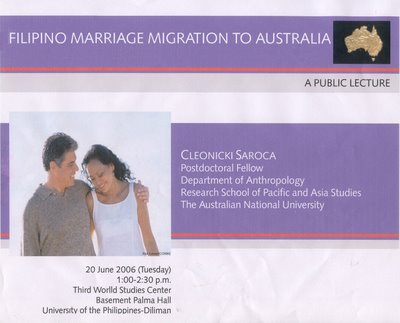
Cleonicki Saroca
Postdoctoral Fellow
Department of Anthropology
Research School of Pacific and Asia Studies
The Australian National University
20 June 2006 (Tuesday)
1:00-2:30 p.m.
Third World Studies Center
Basement Palma Hall
University of the Philippines-Diliman
ABSTRACT
This paper explores the multidimensional factors behind the decisions of Filipino women to marry Australian men and migrate to Australia. It is based on ethnographic fieldwork and interviews with Filipino women who now reside in Australia with their non-Filipino partners. Adopting an intersectional approach, the paper is centrally concerned with how confluences of gender, race and class, as both practice and discourse, informed the women’s motivations for marriage to a foreigner. These intersections are apparent in structural configurations and the cultural logics and discursive constructions of love and desire that shaped their decisions to marry Australian men. Given the centrality of marriage and motherhood in Filipino culture, when the women were denied the opportunity to marry and have a stable family life with a Filipino in the Philippines–because they were single mothers, widows, women past "marriageable age" (matandang dalagas) or had been in an abusive relationship with a Filipino–marriage to an Australian became more desirable. The paper argues that love and desire are entwined with economic considerations. The women contextualise their desires for a better life for self and their families in the Philippines in terms of having a good marriage in Australia in which economic security and a loving partner are paramount. Marriage was not simply a matter of individual choice for these women, but shaped and constrained by factors like family, work, cultural logics and government migratory regimes. Although their agency was constrained within a broader context of unequal power relations, the women made choices about their intimate relationships. The women’s narratives highlight that one of the gendered dimensions of migration is that workers are/become wives and wives are/become workers. The women were workers in the Philippines and, although they migrated as wives, they expected to continue their participation in paid employment in Australia as well as support families back in the Philippines. The case of Filipino teachers marrying Australian/foreign men is particularly illustrative of the links between marriage, migration and work, and the part structural and cultural factors play in seemingly personal choices like marriage. The paper contributes to a broader feminist critique on binary constructions of Filipino women migrants for marriage.
Click this link to read and download Saroca's article in Kasarinlan: Philippine Journal of Third World Studies.



No comments:
Post a Comment